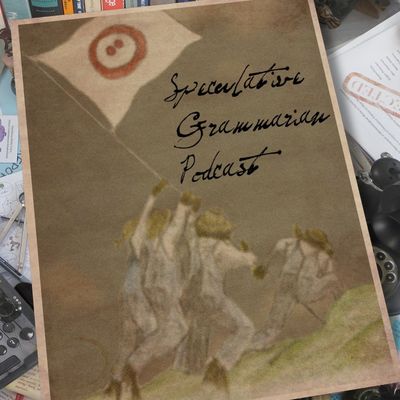Speculative Grammarian—the premier scholarly journal featuring research in the neglected field of satirical linguistics—is now available as an arbitrarily irregular audio podcast. Our podcast includes readings of articles from our journal, the occasional musical number or dramatical piece, and our talk show, Language Made Difficult. Language Made Difficult is hosted by the SpecGram LingNerds, and features our signature linguistics quiz—Lies, Damned Lies, and Linguistics—along with some discussion of recent-ish linguistic news and whatever else amuses us. Outtakes are provided.
http://specgram.com/
Gesamtlänge aller Episoden: 2 days 2 hours 50 minutes
Nursery Rhymes From Linguistics Land
Nursery Rhymes From Linguistics Land; by Yune O. Hūū, II; From Collateral Descendant of Lingua Pranca, October 2009. — Continuing in the great tradition of Stepfather Goose, the following nursery rhymes are presented to ensure their preservation for future generations of young linguists. (Read by Peter iVox, Trey Jones, Rachel iVox, Ryan iVox, Heather iVox, Klaus iVox, Lucy iVox, and Graham iVox.)
An Iñupik Linguistic Fragment (or, the Last Grammarian)
An Iñupik Linguistic Fragment (or, the Last Grammarian); by Metalleus; From Lingua Pranca, June 1978. — The following fragment was found in a shoe box at Indiana University. It was translated by Metalleus with the help of a Phi Beta Kappa key. The author is unknown. (Read by Trey Jones.)
Regular Isomorphisms of Categorization in the Apathetic Informant
Regular Isomorphisms of Categorization in the Apathetic Informant; by Angus Æ. Balderdash, Esq.; From Volume CXLIX, Number 3, of Speculative Grammarian, July 2004. — Unfortunately, it is often the case that when working with data sets containing particularly uncommon kinds of data, the number of qualified consultants available to provide native-speaker interpretations of the data is quite low...
They Don’t Have a Word for It
They Don’t Have a Word for It; Book Announcement from Psammeticus Press; From Volume CLVII, Number 4 of Speculative Grammarian, December 2009. — With the inexplicable success of pseudo-lexicons such as Howard Rheingold’s 2000 “They Have a Word for It: A Lighthearted Lexicon of Untranslatable Words and Phrases”, C. J...
The Oxford Comma: A Solution
The Oxford Comma: A Solution; by Eliza Doolittle; From Volume CL, Number 2, of Speculative Grammarian, April 2005. — The Oxford Comma has once again raised its nasty little head in linguistic circles, thanks largely to the efforts of one Ms Truss and her book, Eats, Shoots and Leaves. It is time once and for all to put this little beast to rest. (No, not Ms Truss, you moron—the Oxford Comma). (Read by Rachel iVox.)
Twenty Special Forms of Rhetoric
Twenty Special Forms of Rhetoric; by Dawn B. Seely; From Volume CXLVII, Number 3, of Speculative Grammarian, March 1993. — Rhetoric has been a topic of academic interest for, approximately, forever. Below are detailed a number of special types of rhetorical argument, some of which, for example, Proof by Impressiveness, have been observed since the time of Aristotle and before. Others, for example, Proof by Intimidation, have been clearly recognized only within the last century...
Ready! Fire! Aim!—A New Approach to Military Combat Using Language Science
Ready! Fire! Aim!—A New Approach to Military Combat Using Language Science; by François Achille Bazaine; From Volume CLVIII, Number 3 of Speculative Grammarian, March 2010. — One of the aims of any branch of scientific inquiry is to improve the lives of men. Surely the Science of Language is no different, and just as surely the lives of soldiers are among those most in need of improvement. The French military has had a long and varied history, with its share of both victory and defeat...
An Introduction to Linguistics in Haiku Form
An Introduction to Linguistics in Haiku Form; by Anonymous; From Volume CLIX, Number 4 of Speculative Grammarian, September 2010. — linguistic theory / hidden representations / to surface structures (Read by Peter iVox.)
Towards a Perfect Definition of the Term “Sign”
Towards a Perfect Definition of the Term “Sign”; by Louis Capet; From Volume I, Number 3 of Better Words and Morphemes, The Journal of the Linguistic Society of South-Central New Caledonia, May 1991. — Saussure defined the sign as the union of the signifier and the signified. Steinmetz emphasized the importance of the interactional element. Burma-Shave proposed that a sign could only be understood in the context of adjacent signs. Modern linguistics has elaborated the concept of the sign system...
French Sues English
French Sues English; by SpecGram Wire Services; From Volume CLIX, Number 2 of Speculative Grammarian, June 2010. — The Académie Française filed a lawsuit today at the European Court of Language Slights in Brussels against the English language, claiming 650 million euros in compensation. The suit against the English language describes “the intentional misappropriation of core elements of French and imitation of its distinctive sound...
